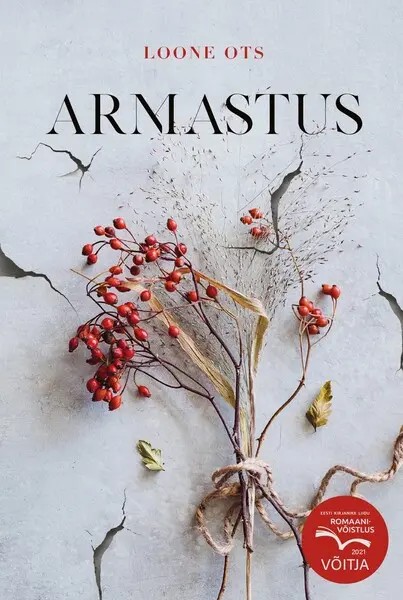Loone Ots’s debut novel won first place in the Estonian Writers’ Union’s 2021 Fiction Contest.
Reviewing Loone Ots’s novel, I must take her educational background into account. Ots studied Estonian philology and folklore at the University of Tartu and co-authored the secondary-school textbook Myth and Literature, which draws lines between ancient tales and modern fiction. That covers Love’s theoretical side: the author knows what she is doing.
As “myth” sounds too monumental, I’d prefer to apply a less dramatic classification: Love is a modern fairy tale that is perhaps comparable to Tolkien’s The Hobbit, or There and Back Again.
On the surface, it is a historical novel in which a young woman, Salme, embarks on a journey from rural South Estonia to the university town of Tartu on a frigid winter’s day in 1942. The distance as the crow flies is about 70 kilometers, which may not seem like much until one considers the journey takes place during the Nazi occupation of Estonia, which entails countless obstacles and restrictions. Special permits were required to leave a local community at the time, and even if one was acquired, there were practically no transportation options in the countryside. Meaning that Salme’s only hope is to hitch a ride in a vehicle commandeered by the occupying German forces – hitchhiking in sub-zero temperatures without knowing whether anyone was driving on that particular road, in that particular direction.
Fortune smiles upon fairy-tale characters, and the same is true for Salme. Those she meets along the way are practically mystical in nature, such as a high-level SS officer who offers her unexpected generosity. The officer is heading to Tartu, not for mass bloodshed but, to remove copies of Reich Minister of Propaganda Joseph Goebbels’s doctoral thesis from the university library, because its content is no longer deemed appropriate.
A masterful ratio of fiction and truth is one of the novel’s strongest features. Taking turns in the narrative are three historical protagonists: Salme (Niilend) who intends to save the life of Isidor (Levin), who is a student of Uku (Masing). All share ties to the University of Tartu. Any reader who is familiar with Estonian history can quickly surmise the Professor of Theology’s surname, and after mere moments may also identify his folklorist protégé and secondary characters like Rein Sepp (a German specialist) and Karl Ristikivi (a writer). In addition to using copious historical sources, Ots gathered details from letters written by the real-life Salme Niilend.
At the time of the novel’s events, Martin Sandberger – the Chief of the Nazi Security Police and SD for Estonia – was positioned to report to Berlin: Estland ist judenfrei. Estonia was cleansed. The phrase, which left Estonia with an extremely lamentable and uncomfortable historical mark, also crosses Salme’s mind as she hastens to find a ride from her family’s farm to Tartu at six in the morning. The fact that she’s hiding a young Jewish man, Isidor, at her childhood home doesn’t fit with the SD chief’s triumphant declaration of “victory”. In the eyes of the occupying Germans, Isidor is as good as dead. There’s just one technical issue: he still has to be located, arrested, and exterminated.
Salme makes it her mission to stop this injustice from happening. She and Isidor met and became friends before the war and, although he has deep romantic feelings for her, she wishes to keep the relationship strictly platonic. Being the apple of her family’s eye, Salme’s father and older brothers agree to help her hide Isidor – an unspeakably risky decision while Nazi troops were occupying the country. Nevertheless, Salme manages to overcome all opposition to her plan thanks to her incredible determination and ability to woo anyone in her way. Any man, at least. Even the SS officer who scoops the young woman up from the roadside offers her protection in the form of an all-powerful letter, which allows her to return home after completing her Tartu mission: acquiring a crucial document that might save her admirer’s life.
All good fairy tales have happy endings, and Love is no exception. It is a tried-and-true theme, not unlike a Brothers Grimm story about a clever young maiden who ventures out into the world, flouting every danger to save a friend, brother, or lover.
Ots’s novel does just what the title promises, delving into a myriad of types of love while neatly avoiding verbosity. She studies the love between two people (although this is steadily one-sided in the novel, such emotions can still move mountains and change the world). The love between a man and a woman, the love between a father and his daughter, and the love between brothers and sisters. Going even further, Ots explores the love for one’s homeland, wisdom, and neighbors. The novel considers love as an idea, applied practice, liberating force, and suffocating pain. Love in spite of harrowing circumstances.
Although written in prose, the work is very poetic. Ots is well-versed in the fine points of 20th-century Estonian cultural history and lets this knowledge speak through her characters. I cannot say if such conversations and debates genuinely took place in the Masing/Niilend/Levin triangle (a non-romantic circle of love and academic camaraderie), but they seem credible the way the author describes them.
At the same time, readers who are well versed in 20th-century history and have studied either Nazi ideology or the logic of occupying forces during the Second World War may form serious doubts about the story. It’s extremely unlikely that a black-uniformed agent of death, the SS officer who picks Salme up as she’s wading through snowdrifts, would be en route to confiscate Goebbels’s doctoral thesis from the University of Tartu, as there are no grounds to believe the university ever possessed a copy. The thesis, defended in 1922 at the University of Heidelberg, was on a little-known 19th-century dramatist and the future Reich Minister of Propaganda received the bare academic minimum required to pass: rite superato. It was never printed as a separate book, and even if it were, there would be no conflicts with Nazi ideology. The only “compromising” detail might be the fact that Goebbels’s academic advisor was Jewish.
The novel includes other minor questionable points, but this is no great flaw if we regard the work as a fairy tale overall – no need for historical measurements if the story is purely poetic.
Ots repeatedly quotes the Song of Songs throughout the novel, and I feel it is indeed a sort of literary continuation, invalidating any historical discrepancies. All in all, Love is not a work of historical fiction: it is a song of praise, and a laudable one at that.





